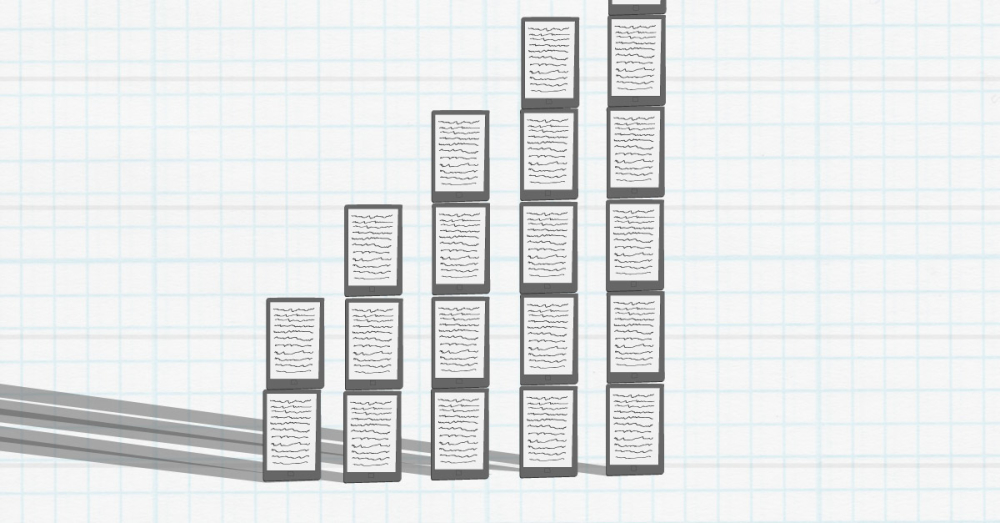No, E-Book Sales Have Not Slipped and the Publishing Industry Knows it

The headlines blared and the Old Guard rejoiced at recent “news” that e-book sales are flat and sales of print books are back. Huzzahs resounded from those who have a stake in writing about, and selling the products of, the five multinational corporations that call themselves the publishing industry. The long national nightmare of the e-book is over.
Except none of it is true. Even buried within the New York Times story that heralded the blessed new numbers is the admission that they decided not to count the largest portion of the e-book business: indie self-published work. “It is also possible that a growing number of people are still buying and reading e-books, just not from traditional publishers,” the New York Times reports. Ya think?
So, essentially, this is not publishing news at all. Like the “news” of comedian Amy Schumer’s recent multimillion-dollar book deal, these stories are about the Big 5 fighting for a large chunk of a shrinking publishing universe, while the real publishing revolution happens elsewhere.
But before I rant further about self-publishing being the unloved stepchild of the industry (read my previous blog post for more on that), I’ll cut to the chase and tell you the good news: the publishing industry, and those who write about it, will soon be forced to acknowledge the huge changes happening in the way authors and readers interact with one another. The result will be a more-robust, democratic, competitive, all-inclusive publishing universe that will make more people happy. To show you why, I need to digress and tell you a story.
The Tale of the Nanotech Blog
I’m very old (turning fifty next week!), so I have a lot of old stories. This one takes us back to 2001. I was news editor for a startup magazine that covered the emerging science and business of nanotechnology. There was a mini nanotech boom going on at the time, with lots of venture capital and government money being thrown at it. The guy who launched it—future Michigan Gov. Rick Snyder—tossed a great deal of dough at our magazine (Oh, how I long for those olden days!).
But I soon became frustrated with the limits of a publication that existed to attract ad dollars as industry boosters, when there was a larger conversation happening outside our magazine about the ethical and environmental implications of the technology and the pace of its development. I couldn’t stand it any longer, so in the summer of 2003, much to the annoyance of my boss, I launched my own blog that covered the implications of nanotech that the magazine couldn’t cover.
Soon, something strange happened. My blog, essentially a one-man publication, was attracting visits from places like the White House, the US Congress, the Pentagon, the New York Times, Wall Street Journal, Wired, and other major media. Almost right away, my blog attracted far more web visitors per day than did my magazine.
This was at the beginning of the web self-publishing (blog) revolution, and mine was just a specialty of a specialty of a science site. It quickly joined the chorus of a rapidly increasing number of blogs for every different interest, fetish, obsession, and niche. A few rose to the top, but most remained obscure, with writing quality that ranged from horrible to profoundly beautiful, the design amateurish to artistic.
If you haven’t guessed yet, I am also describing the current wave of self-published e-books.
Self-Pubs Will Be Counted
Blogs did not replace mainstream journalism, instead journalism absorbed blogging as its own. It’s how I can get away with having this conversation with you right now. Self-published e-books are the new blogs. They are just as easy to produce and represent an even broader variety of opinions, interests, quality, and accuracy. Bring them on. They don’t scare me. And big publishing companies, and the media that cover them, will eventually be forced to acknowledge that self-published e-books are a growing, important part of the actual book industry. My guess is that they will be absorbed and incorporated in the same way blogs were absorbed into what came next in journalism after the long, slow death of print newspapers.
I’m already seeing some signs that is happening. HarperCollins recently advertised for an editorial director to scour self-publishing and fanfiction sites for teens. And, way down in the second-to-last paragraph of that Times story, the newspaper of record reports: “Some publishing executives say the world is changing too quickly to declare that the digital tide is waning.” Well, that’s a start.
The world moved on and so did my career. I shut down my nanotech blog in 2009. But you can be sure I never learned to shut up. Neither will authors with something to say and the publishing tools with which to say it. And, soon, they will be counted.

Howard Lovy is executive editor at Foreword Reviews. You can follow him on Twitter @Howard_Lovy
Howard Lovy
